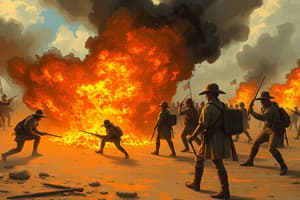Podcast
Questions and Answers
What was the main idea behind the concept of Manifest Destiny?
What was the main idea behind the concept of Manifest Destiny?
- The idea that the US was destined to expand its territory across North America (correct)
- The concept that the US should reduce its involvement in world affairs
- The belief that the US should focus on improving its internal infrastructure
- The notion that the US should only expand its territory through peaceful means
What was the outcome of the Trail of Tears?
What was the outcome of the Trail of Tears?
- The establishment of a new Native American territory in the West
- The peaceful relocation of Native American tribes to Indian Territory
- The formation of a new alliance between Native American tribes and the US government
- The deaths of thousands of Native Americans and the violation of their rights and treaties (correct)
What was the impact of the completion of the Transcontinental Railroad in 1869?
What was the impact of the completion of the Transcontinental Railroad in 1869?
- It stimulated economic growth, trade, and settlement in the West (correct)
- It increased travel time from weeks to months
- It led to the decline of industries such as mining and agriculture
- It reduced the importance of the West Coast in terms of trade and commerce
What was a common issue in industrial areas during the late 19th century?
What was a common issue in industrial areas during the late 19th century?
What term was used to describe wealthy industrialists and financiers who accumulated wealth during the late 1800s using unethical or exploitative methods?
What term was used to describe wealthy industrialists and financiers who accumulated wealth during the late 1800s using unethical or exploitative methods?
Flashcards are hidden until you start studying
Study Notes
Westward Expansion
Manifest Destiny
- Belief that the US was destined to expand its territory across North America
- Coined by John O'Sullivan in 1845
- Influenced US foreign policy and westward expansion
- Justified the annexation of Texas, Oregon, and California
- Promoted American exceptionalism and nationalism
Trail of Tears
- Forced relocation of Native American tribes from their ancestral lands to Indian Territory (present-day Oklahoma)
- Occurred in 1838-1839 during the presidency of Andrew Jackson
- Resulted in the deaths of thousands of Native Americans
- Five Civilized Tribes affected: Cherokee, Muscogee, Seminole, Chickasaw, and Choctaw
- Violation of Native American rights and treaties
Transcontinental Railroad
- Completed in 1869, connecting Omaha, Nebraska to Sacramento, California
- Reduced travel time from weeks to days
- Stimulated economic growth, trade, and settlement in the West
- Facilitated the growth of industries such as mining, agriculture, and commerce
Working Conditions in Industrial Areas
- Poor working conditions, long hours, and low wages in factories and mines
- Labor movements emerged to address these issues
- Child labor, worker exploitation, and hazardous conditions were common
- Urbanization and industrialization led to the growth of cities and social problems
Robber Barons
- Wealthy industrialists and financiers who accumulated wealth during the late 19th century
- Examples: Cornelius Vanderbilt, John D. Rockefeller, Andrew Carnegie, and J.P. Morgan
- Critics accused them of exploiting workers, monopolizing industries, and corrupting politics
- Their business practices and philanthropy continue to be debated among historians
Studying That Suits You
Use AI to generate personalized quizzes and flashcards to suit your learning preferences.




